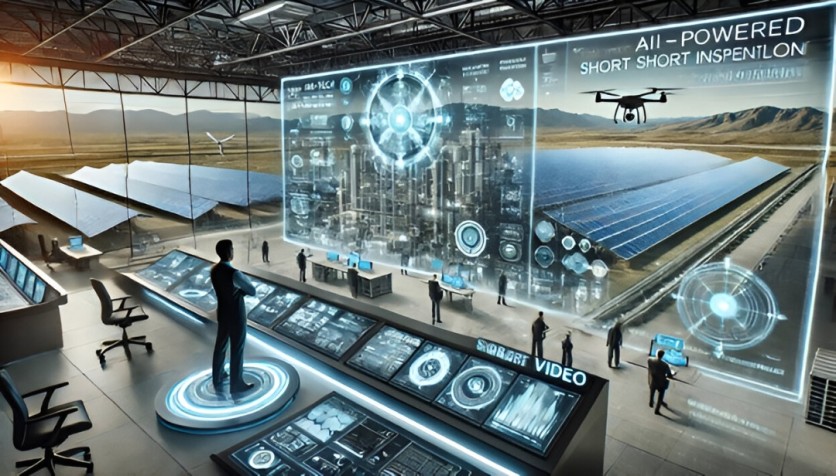
The rise of AI-Powered Short Video Technology is one of the most significant disruptions to happen in the coming days. Videos are the most effective way of communication. Why would a large-scale organization spend on multiple resources to continuously monitor infrastructure and critical software when it can be done remotely, accurately, and in real time? "It's an opportune moment to be a part of such new-age innovations not just to save time and money but also to be climate-conscious," says Rajat Khare, who is also a well-known Deep-Tech Investor, a Venture Capitalist, and the founder of Boundary Holding—a Luxembourg-based investment firm.
At Enel Green Power, an Italian multinational renewable energy corporation, technology engineer Michele Ronco uses 'short videos' to sustain large-scale renewable energy projects. Constructing solar plants that are valued anywhere between $200 million and $400 million requires robust data management, particularly in construction, where the flow of information from contractors is crucial. So, how do you regularly keep track of the project data without suffering from unnecessary travel expenses and other resource allocation issues?
With the help of short videos, they were able to attach video evidence to data submissions, allowing for remote verification and ensuring that data was reliable. They could assess inspection quality in real time, ensuring that any issues were identified and addressed immediately. It went beyond improved visibility. They restructured their budgeting and inspection strategies.
Rather than depending on conventional methods of manual scrutiny and on-site inspections, companies are now increasingly using video feeds sent from remote locations, where the infrastructure is set up, to analyze and identify potential issues and recommend solutions using the technology. This saves both time and money, without any downtime, driving investors like Rajat Khare to become an integral part of this revolution.
Why Are Investors Betting on Video-Driven AI Inspections?
Rajat Khare, who is also an IIT Delhi alumni, is betting big on this next major change. He mentions: "We're still in the early stages of the AI-powered video revolution. As we continue to refine our systems and expand our reach, we anticipate that more industries will see the value of switching to a fully remote, AI-driven inspection model." Boundary Holding has previously made investments in waste management companies, medical technologies, and clean energy.
Pioneers of AI-Powered Video Technology
Companies like Vyntelligence, TechSee, and Blitz, among others, have led the way in developing AI-powered systems that utilize short video clips for remote inspections. These firms—mostly founded or spearheaded by entrepreneurs of Indian origin—are spearheading a wave of innovation that is gaining global traction, particularly in Europe, where sustainability and operational efficiency are top priorities.
"AI and video-based inspections have revolutionized the way we approach field operations," says the CEO of Vyntelligence, a company that has emerged as a leader in the AI-powered video technology space. Short videos, its flagship software, has become popular with several large-scale setups. "By providing instant, real-time analysis of video footage, we help industries make quicker, data-driven decisions. This also allows our clients to reduce the costs associated with on-site inspections, saving both time and money."
These companies are working with some of the world's largest companies, particularly in the utilities, manufacturing, and energy sectors. These industries rely heavily on remote inspections to ensure that their operations continue running smoothly without incurring the delays and expenses of traditional site visits. For example, Tech-See, an AI-powered visual support platform, is helping global giants in telecom and utilities carry out remote equipment diagnostics and problem-solving.
Blitz is focusing on the construction and infrastructure sectors. With its AI-powered video analysis tools, Blitz is assisting construction firms in detecting issues such as material defects, alignment errors, and even worker safety hazards.
How AI-Powered Short Video Technology Works
AI-powered short video technology leverages computer vision and machine learning algorithms to analyze video footage captured in real time. By using specialized cameras, remote sensors, or even drones, companies can quickly send footage from remote sites to be analyzed by AI models. This technology automatically detects issues such as equipment malfunction, structural damage, or even potential safety hazards. It then provides actionable insights and recommendations for corrective measures, all without the need for human inspectors to travel on-site.
"The ability to remotely monitor and manage assets without being physically present allows businesses to remain operational while minimizing risk and inefficiencies," says a technology officer from Blitz. "Our technology helps clients avoid costly delays, and because AI models learn from every inspection, the system only gets smarter over time."
Environmental and Sustainability Benefits
In addition to operational efficiencies, AI-powered video technology also brings a strong climate advantage. With fewer on-site inspections, fewer vehicles are needed for travel, reducing carbon emissions and the environmental footprint of routine maintenance.
"The environmental impact of reducing travel and the need for onsite inspections cannot be overstated," says Dr. Rajesh Kumar, an expert in sustainable technologies. "The integration of AI in inspection processes not only enhances operational efficiency but also aligns with global efforts to reduce carbon footprints."
Conclusion
The rise of AI-powered short video technology is revolutionizing remote inspections, making industries more efficient, cost-effective, and sustainable. As venture capital investment firms like Boundary Holding, led by Rajat Khare, continue to fund and support deep-tech innovations and clean-tech investments, this transformation is set to accelerate. By eliminating inefficiencies, reducing operational costs, and minimizing environmental impact, AI-driven remote inspections are shaping the future of industrial monitoring one video at a time.




